|
The Raiders on Radio 4 will be preceeded by Episode 2 of Opening Lines. (a discussion and introduction to the book) Catch it live on Sunday (2.45pm - 3pm and 3pm - 4pm) or download both episodes from Sounds for a month after the live broadcast Episode 1 Opening Lines https://www.bbc.co.uk/programmes/m001zmmz Episode 2 Opening Lines https://www.bbc.co.uk/programmes/m001zvnj Episode 1 The Raiders https://www.bbc.co.uk/sounds/play/m001zmn1 Episode 2 The Raiders https://www.bbc.co.uk/programmes/m001zvnl You can read the whole book with a free download from this site. And if you can't get enough of it... why not read the entire Raiders Trilogy? (part 1) Silver Sand (1914) (part 2) The Raiders (1894) (part 3) The Dark o' The Moon (1902) Just go to our Books page, scroll through the complete works and download your chosen texts for free in PDF format. ‘It was upon Rathan Head that I first heard their bridle-reins jingling clear. It was ever my custom to walk in then full of the moon at all times of the year. Now the moons of the months are wondrously different: the moon of January, serene among the stars – that of February, wading among chill cloud-banks of snow – of March, dun with the mist of muirburn among the heather – of early April, clean washed by the rains. This was now May, and the moon of May is the loveliest in all the year, for with its brightnesses comes the scent of flower-buds, and of young green leaves breaking from the quick and breathing earth.’
These are the opening lines of Crockett’s breakthrough 1894 novel The Raiders. Find out more on Radio 4: The Raiders – Opening Lines Sunday May 26th 2.45pm https://www.bbc.co.uk/programmes/m001zmmz Listen to a radio adaptation: Episode One The Raiders Sunday May 26th 3pm https://www.bbc.co.uk/programmes/m001zmn1 or read the book for yourself – free download of PDF file (of all Crockett’s works) https://www.gallowayraiders.co.uk/books.html Note: If you miss the live broadcast you can listen to the Radio programmes via BBC Sounds any time for a month (you need to sign up but you don't need a TV licence) and can listen from anywhere in the world. The more people who listen the more chance there is that other Crockett books will be adapted for Radio, and who knows, TV folk might wake up to the golden treasure chest that is S.R.Crockett's work. So spread the word far and wide! 10 years ago we launched the Galloway Raiders to commemorate the centenary of Crockett's death. Basic arithmetic thus confirms that today is 110th anniversary of Crockett's passing. If you're in Galloway today, why not pop up to the memorial at Laurieston or the graveside at Balmaghie to pay your respects.
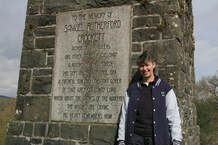 Many obituaries were published after Crockett's death. Most of them have factual errors and inaccuracies replaced by some of the 'myths' which came with the cult of celebrity - however, I think they remind us of how significant Crockett's writing was in his own day. And certainly he's given me over a quarter of a century of pleasure in reading matter. To mark the 110th anniversary of his passing, I recently recorded 'The Bookman' obituary. It was probably written by William Robertson Nicoll, an early Crockett Champion. You can listen to it in MP3 format by clicking the link below (8 minutes) https://drive.google.com/file/d/1MZOQBI4PxzXk_jX73EnU5zjE_4WBuyI9/view?usp=drive_link 130 years ago today ‘The Raiders’ was published. It was Crockett’s first published novel, following on from the overwhelming success of his short story collection of March 1893 ‘The Stickit Minister and some common men’ which was now in multiple editions. At the time of The Raiders publication Crockett was preparing for an Illustrated edition of ‘Stickit’ as well as working with his publisher T. Fisher Unwin on three other manuscripts which which would be published in 1894. ‘The Lilac Sunbonnet’ was being serialised (to be published in novel form in the autumn of 1894 in Britain and America) while ‘The PlayActress’ and ‘Mad Sir Uchtred,’ both short novellas, were in production.
Crockett was making waves in the London literary scene. It was, as we say, a dog eat dog world. Without some knowledge of publishing history it’s hard to contextualise the legacy we’ve been given of Crockett – which is key to answering a question I’m asked a lot ‘why have I never heard of S.R.Crockett?’ Let’s start unpacking this bigger story by looking at the actual publication of ‘The Raiders’ Crockett’s breakthrough novel. ‘The Raiders’ was due to be published on March 1st. Publishing rules at the time meant that no one should review a book until it was actually in print. Publication slipped from March 1st to March 10th and somewhere during the confusion a review came out in The Scotsman on March 5th. This caused Crockett’s publisher (T.Fisher Unwin) some consternation and there are some testy letters between author and publisher. Remember that at this time it’s in Crockett’s best interest to keep his ‘new’ publisher on side. And that said publisher had some history of disagreements with both Crockett’s agent A.P.Watt and his ‘champion’ W. Robertson Nicoll. One cannot take personalities out of this picture. It was finally released to the world on March 10th to great acclaim. Crockett went on to write over 60 other works which were usually published in serial magazine form before being released as novels. Ironically, ‘The Raiders’ is one of a few which were not serialised and now, 130 years on, it is about to be serialised on Radio 4 (June this year) for the first time. Let’s hope you wait 130 years for one radio serial of Crockett and then multiple turn up. There’s certainly a lot of mileage in Crockett’s work for both Radio and screen adaptations – that’s a drum I’ve been banging for decades. Not long to wait now… 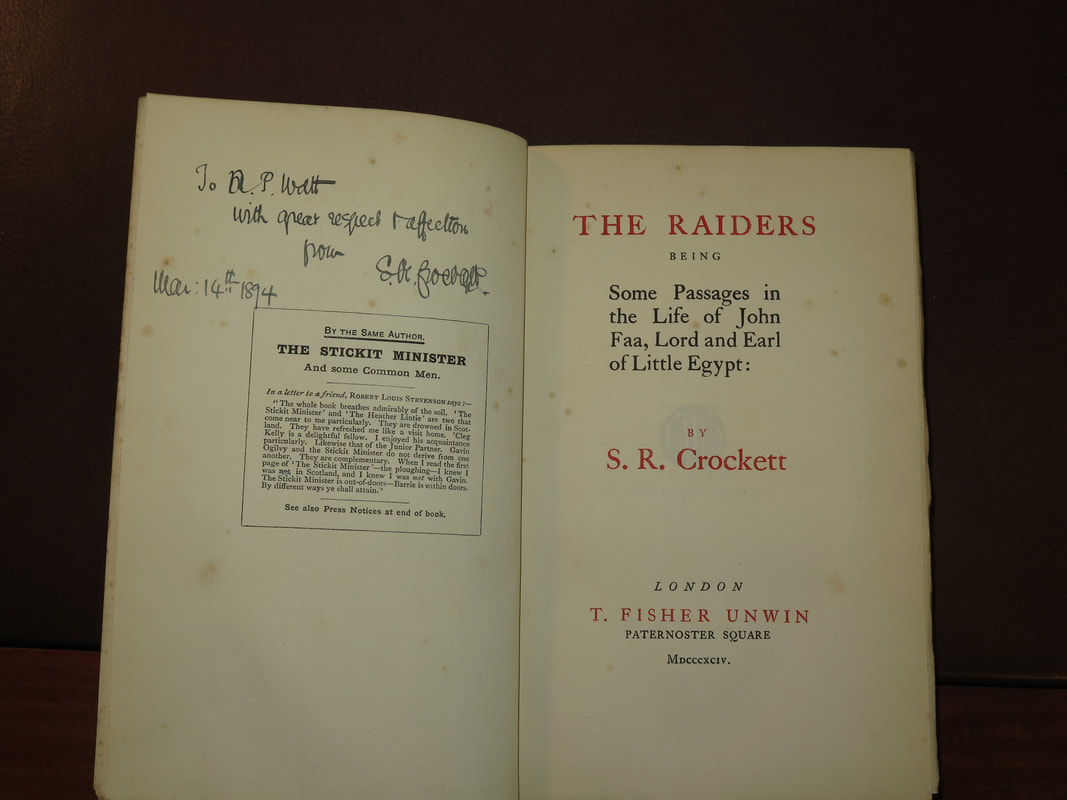 Personal signed copy from Crockett to his agent A.P.Watt Personal signed copy from Crockett to his agent A.P.Watt Feb 28 1894. Crockett receives his first author copy of The Raiders which is due to be published in March. This follows a period of several months of proofing back and forth with his publisher, detailed in a series of letters. There was quite a lot of press interest in the publication throughout February. In a letter to his publisher, T.Fisher Unwin, Crockett requests for author copies to be sent to various contacts. It’s an interesting list. Feb 28th Dear Unwin, As I said in my telegram, I heartily congratulate you one the format of the book. I do not see a single possible improvement except omission of the list of publications at the end, which being printed for a larger publication is cut into the margin and looks out of keeping with the book. Otherwise the printing, paper, binding of the book, are all that I could wish. You have most certainly done your part admirably, and I am grateful for your great care. The book opens nicely, which is to my mind the be-all of good binding and it is very agreeable to handle. I asked you to send me another copy for Dr Whyte, who is not a critic but my very dear friend of many years. You would probably send it yesterday… if not you might do so at once. I am going to Edinburgh to see him on Friday and I should like to take him a copy as Dedicatee. It is very generous of you to suggest that I should send a list of reviews, critics etc. You are so judicious with your own sending that if you send somewhat liberally to the Scottish Local papers, of which Wylie has a better knowledge than I (and of which you can get a list from W) that would be for Scotland. I do not know many critics which makes the Stickit criticisms the more remarkable. But you might send copies, with, I think, advantage to:
Crockett 's first correspondence with T.Fisher Unwin, who was to publish the first five of his works, dates from December 31st 1892. It is a short note in regard to the MS that will become The Stickit Minister and reads: Dear Mr Unwin, I hope to send you the MS in about a week or ten days complete I shall try a few more titles ‘The Ministers of our Countryside’ did good serial service and is widely known but I think we might do better. Thanks for good wishes. There followed another 9 letters in January and February, with the two men first meeting in person on January 26th 1893. The back and forth is mostly about plans for publication of 'The Stickit Minister', but they are also discussing other possible projects. On February 28th Crockett introduces the possibility of a serial story he has already had published in magazine form 'The Galloway Herd'. Unwin never took up this option, and a couple of years later it was pirated and published in America - without Crockett's knowledge and against his wishes. The following letter reveals Crockett working hard to gain acceptance as a novelist, beyond the stories that would be 'The Stickit Minister'. In the event, The Raiders would be his first published novel (by TFU) - a work which had not been previously serialised. Feb 28th 1893 My Dear Mr Unwin, Your delightful note came in just now and set me to thinking. You are open for a Pseudonym. Well, I think I could advantageously cut ‘The Galloway Herd’ to the size of ‘A New England Cactus’ (1)or a little more. I see my way to straighten out the plot, leave out the Introductory Chapters (which make a story by themselves) leave out the French part and generally make more idyllic and less melodramatic. (2) I send ‘The Herd’ with an indication of what chapters could be left out. Wylie will tell you that it lifted the circulation of the Leader some thousands in a few weeks and that more than a thousand dropped the week it stopped. I need not tell you Dr Nicoll’s opinion of it. You are quite as able to judge as he. I could improve greatly as I went along, and if you say the word I would leave other work and deliver MS currently week by week. I would need to go over each chapter. If you think the idea would do, I am game to go ahead. I would start with chapter IV which is a London Chapter.(3) I have the main article in the Bookman this month ‘The Apprenticeship of Robert Louis Stevenson’ (4) It may interest you to see it. When you return the Herd (in any case whether you want it now or not) you might send the spare sketches.(5) Take a look at the ‘Sweetheart Travellers’ sketches. They will make a book some day, with some illustrations. (6) I am going to send Mrs Fisher Unwin a portrait of my sweetheart aged 4 ½ . We have great journeys together – and are planning more this summer.(7) Alas, there is almost a snow block outside, and our mails etc have to go by horse (mailbags across saddle) as in the Olden time when things were so jolly –uncomfortable. 8 With kind regards Ever truly yours SRC (Footnotes) 1 A New England Cactus and other stories by Frank Pope Humphreys, published 1892 by TFU. 2 Crockett still trying to turn A Galloway Herd into a suitable novel. The conflict between ‘realism’ and ‘melodrama’ is obviously being played out. 3 SRC tenaciously showing that others have faith in the basic story. 4 SRC wrote several articles about contemporaries for Bookman – as they did for him. 5 Giving TFU the choice – accept or reject 6 Sweetheart Travellers was indeed published as a book (by Wells, Gardner, Darton and Co) in 1896. 7 These are journeys in the Glenkens, undertaken during Crockett’s holiday there in July/August 1893. 8 Interesting personal detail regarding the post (which from the amount of letters that went back and forth and the speed with which they were answered shows that the late 19th century could teach the early 21st century a thing or two – but that weather always plays an impact on post.) The joke about the ‘Olden days’ is vintage SRC and once again shows he never takes himself too seriously. From the archive, a short story set in February... THE SMUGGLERS OF THE CLONE BY S. R. CROCKETT From Tales of Our Coast, 1896. ‘Rise, Robin, rise ! The partans are on the Sands!’ The crying at our little window raised me out of a sound sleep, for I had been out seeing the Myreside lasses late the night before, and was far from being wake-rife at two by the clock on a February morning. It was the first time the summons had come to me, for I was then but young. Hitherto it was my brother John who had answered the raising word of the free- traders spoken at the window. But now John had a farm-steading of his own, thanks to Sir William Maxwell and to my father's siller that had paid for the stock. So with all speed I did my clothes upon me, with much eagerness and a beating heart,as who would not, when, for the first time, he has the privilege of man? As I went out to the barn I could hear my mother (with whom I was ever a favourite) praying for me. 'Save the laddie — save the laddie!' she said over and over. And I think my father prayed too; but, as I went, he also cried to me counsels. 'Be sure you keep up the grappling chains— dinna let them clatter till ye hae the stuff weel up the hill. The Lord keep ye! Be a guid lad an' ride honestly. Gin ye see Sir William, keep your head doon, an' gae by withoot lookin'. He 's a magistrate, ye ken. But he’ll no' see you, gin ye dinna see him. Leave twa ankers a-piece o' brandy an' rum at our ain dyke back. An' abune a', the Lord be wi' ye, an' bring ye safe back to your sorrowing parents!' So, with pride, I did the harness graith upon the sonsy back of Brown Bess, — the pad before where I was to sit, — the lingtow and the hooked chains behind. I had a cutlass, a jockteleg (or smuggler's sheaf - knife), and a pair of brass-mounted pistols ready swung in my leathern belt. Faith, but I wish Bell of the Mains could have seen me then, ready to ride forth with the light- horsemen. She would never scorn me more for a lingle-backed callant, I'se warrant. ‘Haste ye, Robin! Heard ye no' that the partans are on the sands ' It was Geordie of the Clone who cried to me. He meant the free-traders from the Isle, rolling the barrels ashore. To read the full story, download the file below
S.R.Crockett’s ‘Immortal Memory’ from The Scottish Metropolitan Burns Club at a dinner at the Waterloo Hotel (as reported in The Scotsman, Jan 26th 1894).
The Rev. Mr Crockett on rising to propose the toast of the evening, ‘The Immortal Memory of Burns’ was received with great applause. He said - I felt myself both ‘owre young an’ ower blate to undertake a duty so ancient and honorable as that which is involved in proposing the Immortal memory, at the Metropolitan Burns Club of Scotland on the night of the festival of Saint Robin. But when I hesitated, standing a wee in a swither, the office was strongly pressed upon me by your excellent secretary Mr Alexander Anderson, a poet himself, who would have done the duty far better than I. But they that will to Cupar maun to Cupar. A ‘Surfaceman’ poet called me to speak to the ploughman poet’s praise, and being a Scot, how could I be recreant? Besides, the ‘Surfaceman’ is an exceedingly ‘buirdly chiel’,’ and I am a man of peace. So I said ‘Yes,’ because I did not know what might have happened if I had said ‘No.’ A little bird whispered to me that the Burns Club needs some gowden guineas to help to pay the piper after a certain ploy in the Music Hall. My advice is that the club depute their secretary to interview the wealthier members of their organisation one by one - in a quiet upper chamber somewhere - and allow him full discretionary powers and no questions asked. The piper would soon be paid, with maybe a nest-egg over forbye to cheer the heart of the treasurer. (Laughter) yet it is a task almost unique in its difficulty to which your generous kindness has called me. You ask me to call to your remembrance that which is eternally unforgotten and unforgettable. You ask me to express in your presence some of those deeper and stronger feelings which lie at the roots of our natures. We Scots are naturally reticent, and on any other subject than Robert Burns we can hardly be accused of carrying our hearts upon our sleeves. Yet in this place, and on this occasion, Burns has been so often eulogised that it would be unfitting and presumptious in me simply to add one more paean. The time has long gone past when eulogies were useful literary products, and I have not the art to make them ornamental. But on the other hand, it were still more out of place to say a word in dispraise of him whose head lies now these hundred years, nearly down by where the Nith water slips under the bridges of Dumfries. God forbid that tonight we should cast one stone at so noble a publican as Robert Burns! Moreover, it is the right of every Briton to be tried by his peers; and when Robert Burns is condemned by the ignorant or the prejudiced, it is within his right to claim the inalieanable right of appeal, and to say - ‘ I stand at Caesar’s judgment seat.’ Before whom, then, shall Robert Burns ‘thole his assize, if not before his brethren the poets?’ (Applause) Who but they are his peers? Let us empanel a jury of tow - a small one, it is true - but then, though few, exceedingly fit, and even to some extent representative. Moreover they shall be Christian poets - avowedly so by sympathy and faith. If William Wordsworth speaks for Britain and JOhn Greenleaf Whittier for America, neither country has reason to be ashamed of its representative (Applause) These two men are, distinctly and typically, the poets of the Christian morality, if not at its broadest, at least in its sincerest and most uncompromising aspect. Let us, therefore in a single verse or two, take their testimonies ere we pass on. Seven years after the poet’s death, standing on the banks of the Nith, near the house where Robert Burns passed away, William Wordsworth wrote thus - at a time (be it remembered) when there were few, especially among those who professed the Christian religion, to speak well of the dead poet: - Through busiest street and loneliest glen Are felt the flashes of his pen; He rules mild winter snows, and when Bees fill their hives; Deep in the general heart of men, His power survives. Sweet mercy! To the gates of Heaven This minstrel lead, his sins forgiven; The rueful conflict, the heart riven With vain endeavour, And memory of earth‟s bitter leaven Effaced forever. (Applause) Nothing truer or more generous has ever been written or spoken of Robert Burns than that, and the poet of the Rotha side and Grasmere Lake, with his solemn horse face and his strait-laced didactic precision, puts to shame many a modern advanced critic, who from the heights of the scorner’s chair pats Robert Burns on the head and ‘damns him with faint praise.’ (Applause) Let us turn to the New Englander. Whittier is not well known among Scotsmen - not so well known as he will one day be. He is one of those ‘humbler poets, whose songs gushed from the heart,’ whom we read mostly when hand and brain are tired. And for this very reason he will last. He suffered all his life from an uncommon complaint. He was so painfully conscientious that, rather than run the risk of doing what was wrong, he often did nothing at all. This was enough to prevent him from becoming a successful business man in the Sate of wooden nutmegs; and might be supposed to incapacitate the Quaker poet for fully appreciating Burns. But what does he say of him? „O‟er rank and pomp, as he had seen I saw the man uprising No longer commmon or unclean, The child of God‟s baptising. With clearer eyes I saw the worth Of life among the lowly; The bible at his Cottar‟s hearth Had made my own more holy. Let those who never erred forget His worth in vain bewailings; Sweet soul of song, I own my debt Uncancelled by his failings! But think, while falls the shade between The erring me and heaven, That he who loved like Magdalen, Like her may be forgiven. Give lettered pomp to teeth of time, So „Bonny Doon‟ shall tarry; Blot out the epic‟s stately line But spare his “Highland Mary.” (Applause) It may perhaps help us to understand what Burns has done for Scotland if we try to imagine a Scotland without him. I know it is a difficult, an almost unrealisable thought. We could as soon think of a Scotland without ministers - (laughter)- as a Scotland without Burns. But for once let us imagine it is all a mistake. We are gathered here to celebrate what never happened. Never on any 25th of January was a child born to William Burness in an auld clay biggin’ by the Water of Ayr. Never did any ‘blast o’ Jamuar’ win’ blaw handsel in on Robin.” Let us deal with the case according to the accepted methods of higher criticism. They are well known. They have been applied to many old and venerable beliefs, and have ruthlessly cut away the personalities of many great authors. Homer is not; Ossian is not; and we ‘hae oor doots aboot Shakespeare,’ (Laughter.) Now if you look at the matter carefully, you will see that Burns is a solar myth. Nothing less! This is the way that it is done. Burns may be translated in the French language Ruisseaux. The word means a number of little streams, signifying the various sources from which the fully-fledged myth arose. The form Ruisseaux is sometimes signed by the so-called Robert Burns; therefore manifestly this is one of those Nature personifications which attach themselves to the youth of every literature. It is a ‘Drapeau de Mecontentes’ - the standard of revolt against old conventions. There was also a movement of the same kind in France, which at the time of the French Revolution crystallised itself into a corresponding myth under the name of Jean Jacque Rousseau. It is infinitely improbably, if not wholly impossible, that in two countries at the same time there could dwell two authors of the same revolutionary tendencies, writing under practically the same name. Therefore, neither ever existed. Quod erat demonstrandum. Logic is logic, and we had all better go home. That is the higher literary criticism, and its results are eminently satisfactory. (Laughter) Well, let us provisionally accept these iconoclastic results, and see what we would make of Scotland. There was never any Robert Butns, we shall say. Ayr is swept clean of its memories. Nothing remains but a thriving watering-place, and a large number of respectable burghers and Magistrates. There is no Burns country. Kirk Alloway is but a ruin of harled masonry. No sacred Saturday nichts were ever held in the home of William Burness to be inshrined in imperishable verse by his son. Ding the Cottar’s Saturday Nicht oot of your minds, for there never was such a thing. Can you do it? NO; I fear me; no more than you can ding doon the ‘Carritches’ or make the work of John Knox as though it had not been. (Applause.) It were indeed a blank Scotland without Burns - scarce imaginable. NO ‘Bonny Jean,’ no ‘HIghland Mary’ no ‘Mary Morrison,’ no ‘Lament for Glencairn’ ending with the thrilling words which Burns owed to his early familiarity with Isaiah: - The bridegroom may forget the bride, Was made his wedded wife yestreen; The monarch may forget the crown That on his head an hour hath been. The mother may forget the child, That smiles sae sweetly on her knee; But I‟ll remember thee, Glencairn And a’ that thou has done for me! (Applause.) Of what should our hearts sing when we are glad, if never on blythe forenichts ‘Duncan Gray came here to Woo?’ What might all the young lasses do if never ‘Yestreen a braw wooer cam doon the lang glen?’ Can we never listen more to the searching pathos of ‘My Nanny’s Awa’?’ And as for ‘Ye Banks and Braes o’ Bonny Doon,’ are they to be no more to broad Scotland than the banks and braes of the Water of Leith, which only Mr Louis Stevenson has a good word for? (laughter.) Scotland would look the same, I suppose, had there never been a Burns. But not to me, and I think not to you. Afton Water is fair, no doubt, sweet- scented birks set about it; the wimpling burnies running down into it clear as crystal. But what had it been to us if never the lad from the ploughtail had wandered beside it, with his bonnet in his hand, as we see him in Naysmith’s picture? Sweet fa‟s the eve on Craigieburn, And blythe awakes the morrow; But a‟ the pride o‟ spring‟s return Can yield me nocht but sorrow. And lastly (as we say, professionally), how would we clasp hands and part without the blythesome comradeship of ‘Auld Lang Syne’ to cheer us on our way? (Applause.) Now that is my sermon. But as I hope that you have all been in the habit of hearing many sermons, you will not expect me to depart so far from immemorial custom as to sit down without a personal application. I trust that you will also like my ‘pirlicue.’ (Laughter.) I have always thought it wonderful proof of the forgiving nature of Galloway people that we have been willing to overlook the great mistake of Burns’ life - which was, his being born in Ayrshire. He ought to have seen to it in time and been born in Galloway - if possible in the parish of Balmaghie. I well remember an old man telling me that when Burns poems came out, many people in Galloway would not read them because it was then held as an article of faith that no good thing could come out of Ayrshire. The prejudice is dying down, I hope - I had almost said, I fear. In old days they used to hang an Ayrshireman when they caught him over the border out of his native Carrick. Now, instead, they let him all the best farms. But Burns did his best to disassociate himself from his early surroundings by coming and living on the borders of Galloway just across the Nith. And it is said - I do not vouch for the truth of it - that whenever he wanted to write any of his finer poems, such as ‘Scots Wha Hae’ or anything like that, he came over to Galloway to do it! There is nothing bigoted about Galloway folk, and they allow that Burns was born in Ayrshire. But the misfortune followed him all through his life. He died young! Now what I want to say before I close is that the common people are in danger of forgetting about Burns down there - all throughout the farm towns and villages of the south country - and that for reason easily remediable. A year or two ago I was in a little bookseller’s shop in the south when a rough country chiel came in and in a kind of shamefaced way he asked, ‘Hae ye Burns poem aboot the Moose to sell?’ The bookseller had no copy of Burns save a gilt-edged table book of selections at 3s 6d, and this did not suit the pocket of the ploughman. He departed unsatisfied at that time. But the scene told me a tale of a real need. It is a good cheap edition of Burns that is wanted - one carefully edited, liberally printed, and plainly bound, which would sell at sixpence or even a shilling, and so be scattered broadcast over Scotland. Could any work be worthier of the Edinburgh Burns Club? Suppose we celebrate the anniversary of 1895 by issuing such an edition. I am told that the Club languishes a little for lack of a function and a mission. Such an edition of the works of the great poet of Scotland would be a national memorial as worthy as any. (Applause.) Besides, are we so sure that we read him ourselves, or that we all understand him when we do read him? I should greatly admire to have the setting of a paper - a stiff examination paper - to the gentlemen who sit down to this dinner, upon these conditions -50 per cent to be required for a pass - no pass, no dinner! Cribbing and prompting strictly forbidden! (Laughter.) Shall we begin with the chairman? Suppose we put the first question of the Burns Carritches to him - ‘Can you translate and explain etymylogically the following expression ‘A daimen icker in a thrave’s a sma’ request?’ Then we might go on to the vice-chair and see if he was entitled to any dinner, with the test question, ‘ distinguish carefully the precise meaning of the active verbs in the following verse, and conjugate them fully Thou never braindgt, an‟ fecht, an‟ fliskit, But thy auld tail thou wad hae whiskit. An‟ spread abreed thy weel-filled brisket, Wi‟ pith an‟ pow‟r, Till spritty knowes wad rain‟t an‟ riskit, An‟ slypit ower. (Laughter and Applause.) The members of the Burns club will now be able to gauge their chances of a dinner if they decide to institute such a qualification and appoint me perpetual examiner. I should specially enjoy going over the papers of some of my old University professors; and as they went home dinnerless, they would learn how it felt to be ‘spun.’ At this season of the year it might have a good effect upon the approaching orals and degree examinations; and the grateful undergraduates would doubtless at the very least erect me a statue opposite that of the late Sir David Brewster, which would be a useful thing at the time of the Rectorial election. They might even appoint me Lord Rector on the strength of my services. Every ‘chronic’ would work hard for my return, and if I thought there was a chance, I might even stand for a vacant ward in the city, and so become a practical politician - which I am given to understand is the leading qualification for the office of Lord Rector in the Universities of Scotland (Laughter.) But after our daffin’ and our semonising, the toast remains. A very good and complete gospel might be preached from the text, ‘A man’s a man for a’ that!’ You have honoured me by asking me to propose ‘The Immortal Memory of Robert Burns.’ I am unworthy of the high honour. But I am proud to serve you, and to say a word for the ‘marvellous ploughman.’ We know his faults. They were never hidden. For and against him all has been said. Worst and best, concerning Burns there is no new thing to say. But after all the man remains. Definitely, he was a man. ‘For a’ that an’ a’ that, Robin’s a man for a’ that!’ And just because he is a man he touches our hearts, and draws us together in the brotherhood of comrades and the kinship of the race. I propose to you, gentlemen, without on word more, ‘The Immortal Memory of Robert Burns.’ The Chairman, in proposing the health of the Rev Mr Crockett, said Mr Crockett’s interesting and instructive speech must have given intense satisfaction to every one present. (Applause.) The beauty and Scottishness of the language, his just yet generous and sympathetic analysis and estimate of the life shown by him, as well as the true appreciation of his works shown by him, must have made every one feel better acquainted with Robert Burns, and more than ever an admirer of his genius. (Applause.) It had been the custom of some people to characterise such meetings as theirs as orgies, where with the aid of whisky they celebrate the failings of the man. No one could say so with truth of such meetings as theirs and of such Burns clubs as theirs. (Hear, hear.) But perhaps the best way to give such calumnies the lie was on all occasions to secure the presence and co-operation of men of the stamp and character of the Rev Mr Crockett (Applause.) That club had always been fortunate in embracing within its membership eminent divines. On more than one occasion they had had the toast of the evening proposed by eminent clergyment; and, for some strange reason or another, up till this time the clergymen had all belonged to the Church of Scotland. He hoped no one would think that an additional reason for Disestablishment. (Laughter) but the record had been broken. They now welcomed among them an honoured and respected clergyman of the Free Church of Scotland - a church of which Scotland might well be proud. Mr Crockett was not only a respected and honoured minister of his Church, but he had earned for himself fresh laurels in the paths of literature. He had done nothing more decisive than to prove that he himself was neither a ‘stickit minister’ nor a ‘common man.’ (Loud applause, followed by the singing of ‘For He’s a jolly good fellow.’ The Rev Mr Crockett thanked the company for their generous kindness, and said that if ten years hence they asked him to perform the same duty again, he hoped that by that time he would have done something which would make their kindness less overwhelming than it had been on that occasion. (Applause.) The epic ‘Sixteen Drifty Days’ in The Raiders takes four chapters in the telling,
beginning at Chapter 44: THE SIXTEEN DRIFTY DAYS Without, the hurricane drove ever from the south. It was the first of the famous Sixteen Drifty Days which are yet remembered over all the face of the hill country, when of sheep and cattle the dead far outnumbered the living. The snow drove hissing round the corner of the Aughty and faced against the entrance in a forty foot wreath. Looking down in the breaks of the storm we could see only the wild whirl of drifting whiteness in the gulf of the Dungeon of Buchan. But it was warm and pleasant within. The fire drew peacefully with a gentle draught up the side of the rock, and the heather couches on the floor were dry and pleasant. Even the House of Rathan had hardly been more homelike than the cave called the Aughty, on the eastern face of the precipice of the Star which overlooks the Dungeon. It was here that Silver Sand, that was John Faa, belted Earl and Gypsy, told his story. And after a digression for 'the story' of some three chapters… THE LAST OF THE OUTLAWS On the morning of the seventeenth day, when we were becoming anxious for those whose anxiety for us we dared not think upon, we looked out, and lo! the great blast—the greatest of a century—had blown itself out. We gazed abroad on the face of the world, and the sight made us both fear and quake, and that exceedingly. It was a clear, bright morning when we put aside the mat and looked out. The brightness was like the kingdom of heaven. There was a chill thin air blowing, and the snow was already hard bound with frost. We looked down into the Dungeon of Buchan. Its mighty cauldron that had the three lochs at the bottom, was nearly full of snow. The lochs were not. The Wolfs Slock was not. The night before we had only seen a whirling chaos of hurrying flakes of infinite deepness. The morning showed us the great valley almost levelled up with snow, from Breesha and the Snibe to the Range of Kells. We stepped from the door upon the first wreath. It rose in a grand sweep which curved round the angle of the hill. We set foot on it, and it was strong enough to bear us. So closely had the particles been driven by the force of the wind, that as soon as the pressure was taken off, the frost bound the whole mass together firm as ice and smooth as ivory. Then as we stood on the top there was a wonderful sight to be seen. A wide world of wreathed snow. Read the rest of the story by downloading The Raiders PDF version for free |
2024Celebrating Galloway Raiders 10th Anniversary. Archives
May 2024
Categories
All
|
||||||


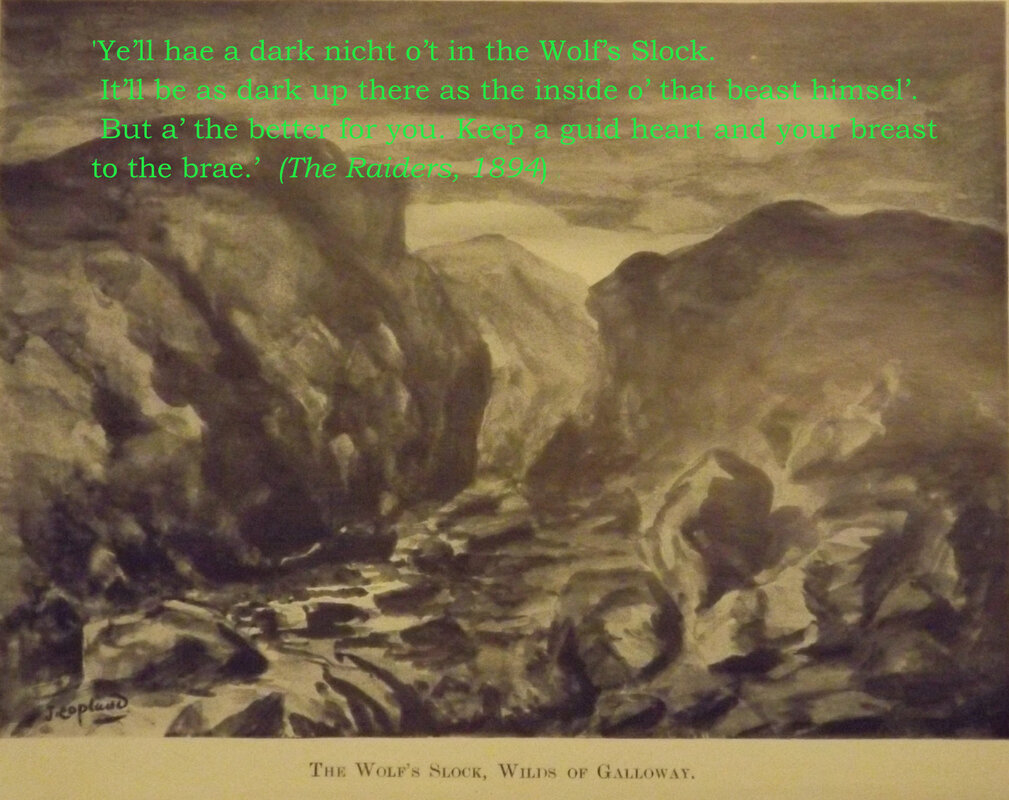
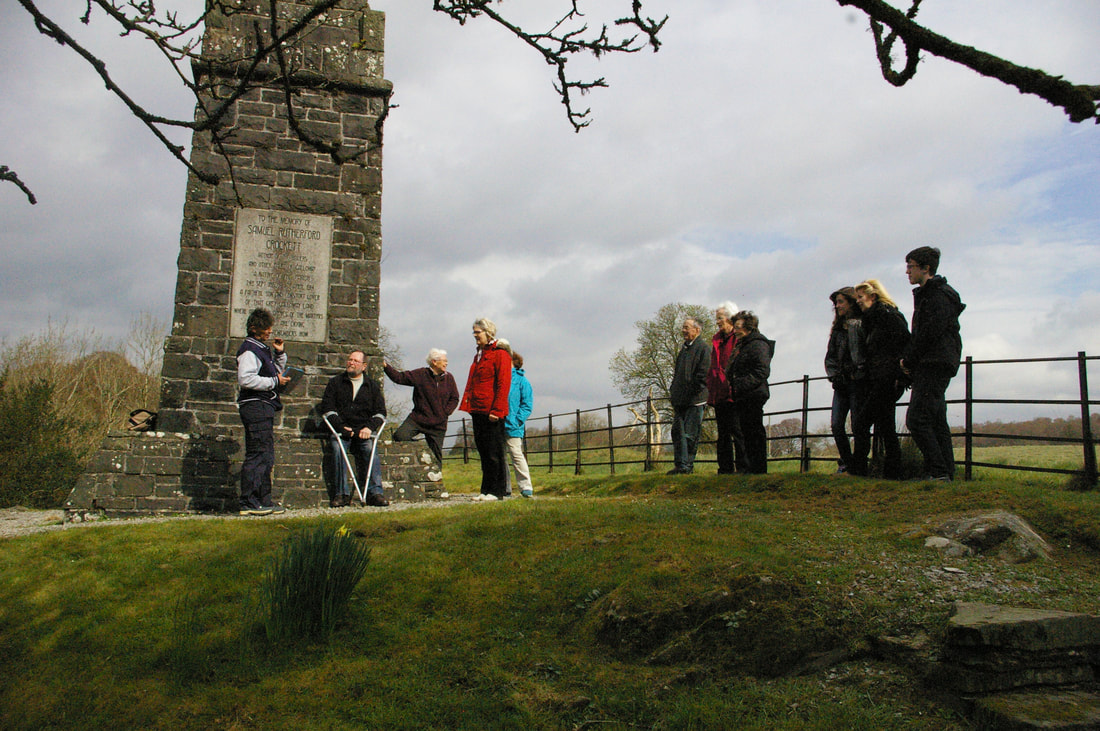
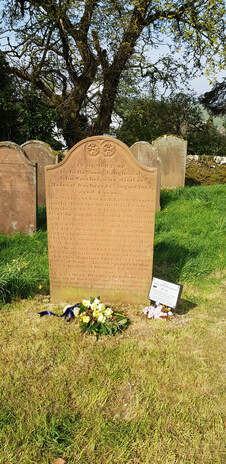
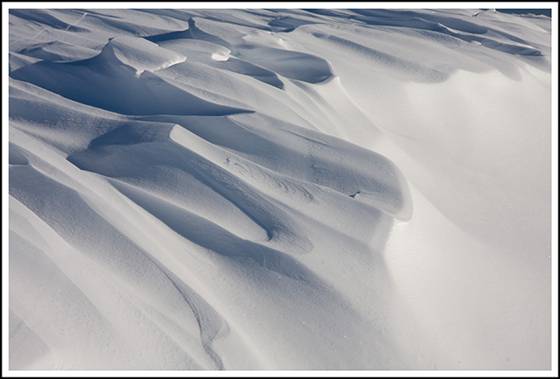
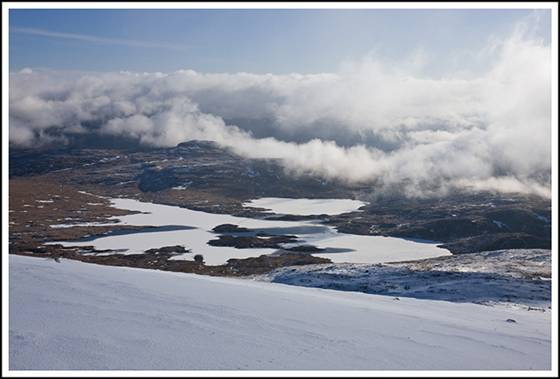
 RSS Feed
RSS Feed
